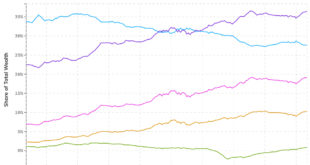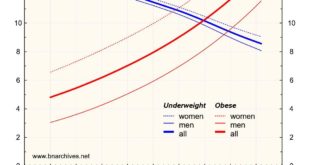from Dean Baker We all know about the Trumpers’ big lie: somehow millions of votes were stolen from their hero, but the liberals were so smart in their steal that Trump’s team can’t produce any evidence. That one rightly draws contempt from anyone not in the cult, but what about the big lie that the vast majority of intellectuals seem to accept? Regular readers know what I am talking about. The big lie is that the massive rise in inequality over the last four decades was somehow the...
Read More »How to lie with inequality statistics
from David Ruccio In the world according to Paul Krugman, “most Americans” have gotten considerably richer over the past two years (even if “the gains have been especially big at the top”), “lower-income Americans [have] seen relatively large income gains,” and “the simple story that the pandemic has been great for the wealthy and bad for the working class doesn’t hold up.” Really? To support his argument, Krugman trots out a series of charts from Realtime Inequality, which is in fact an...
Read More »Summers stumbles
There’s been a lot of debate lately about whether tightening of anti-trust legislation might be a useful response to inflation. Underlying this question is that of the relationship between monopoly and inflation more generally. The dominant view among mainstream/neoclassical economists seems to be that there is no such relationship. That view is stated by one of the most prominent mainstream theorist, Larry Summers as follows There is no basis in economics for expecting increases...
Read More »An MMT perspective on the public debt problem
from Lars Syll One of the most effective ways of clearing up this most serious of all semantic confusions is to point out that private debt differs from national debt in being external. It is owed by one person to others. That is what makes it burdensome. Because it is interpersonal the proper analogy is not to national debt but to international debt…. But this does not hold for national debt which is owed by the nation to citizens of the same nation. There is no external creditor. We owe...
Read More »The end of hope
If you want to mark the end of hope for US democracy, last weekend was as good a date as any. Both Trump and the Republican National Committee made unequivocal commitments to supporting the insurrection. The response, on the Republican side, was much the same as in every previous step along the road to dictatorship. The usual handful of serving politicians, like Romney and Hogan (MD governor) objected, as did sometimes-Trumper Mitch McConnell, but none (not even Cheney and...
Read More »Obesity
from Shimshon Bichler & Jonathan Nitzan Here is a silent killer. While the proportion of the world’s population subject to hunger keeps falling, that of the overfed, mostly with junk, is climbing. In 2005, the two trends crossed: for the first time in the history of humanity, the number of obese people surpassed that of the underweight, and the process continues unabated. The latest data, for 2016, show that almost 14% of the world’s population is now obese — nearly three times more...
Read More »Open thread Feb. 8, 2022
Social sciences and the colonised mind
from Prabhat Patnaik A crucial component of the imperialist system is the colonisation of third world minds that helps to sustain it. This colonisation is pervasive, but here we shall discuss only academic colonisation and that too relating to the social sciences. Social sciences are of critical importance because the problems of the third world are above all social problems, and since the colonisation of third world minds has the effect of inculcating in them the belief that imperialism...
Read More »Open thread Feb. 4, 2022
Theorizing varieties of capitalism: economics and the fallacy that “There is no alternative (TINA)”
The VoCs approach to capitalism has the potential to transform economics. It tacitly emphasizes the plasticity of economies, whereby their character and outcomes are significantly a matter of choice. This paper augments VoCs theory to include a distinction between varieties and varietals of capitalism. Drawing on biology, varieties correspond to species and varietals correspond to […]
Read More » Heterodox
Heterodox



